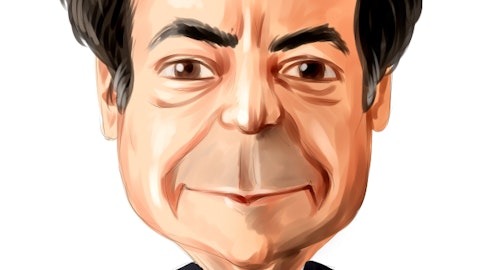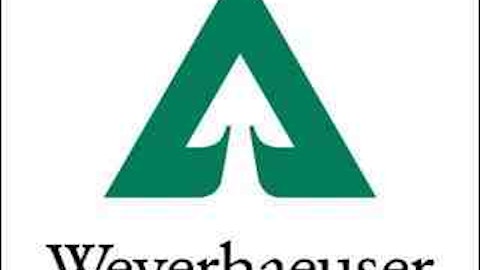Prem Watsa, manager of Fairfax Financial Holdings, has been called “the Warren Buffett of Canada” for his value investing prowess (Fairfax’s book value has increased at about 25% per year since 1985) and for sharing ownership of several stocks with Berkshire Hathaway. At the end of June, Fairfax had owned 18.5 million shares of paper company Resolute Forest Products Inc (NYSE:RFP), a Canadian player in the industry with a $1.2 billion market capitalization and a focus on newsprint and commercial printing papers. This made it the third largest position in Fairfax’s 13F portfolio. See more of Fairfax’s favorite stocks. Resolute went public in December 2010 and the share price has since slipped 43%. Now Watsa and his team have added shares, buying over half a million additional shares at an average price of $13.44. Resolute Forest Products Inc is also a favorite of Steelhead Partners, managed by Michael Johnston, which reported a position of 12.9 million shares at the end of the second quarter (research more of the fund’s holdings). Billionaire John Paulson’s Paulson & Co. also owned the stock at the end of June, with 3.3 million shares in its portfolio (see John Paulson’s stock picks).
In the second quarter, Resolute’s revenues were down slightly from the second quarter of 2011. The company generally kept costs in check; an $84 million increase in closure costs helped drive operating income down $88 million, to an operating loss of $36 million. This caused the company to lose 20 cents per share, and business for Q1 was not particularly good either. Both prices and shipments were down throughout the first half of 2012.
Wall Street analysts expect Resolute Forest Products Inc to recover somewhat in 2013, with earnings per share for the year expected to be 96 cents. At the current price of $12.50, that represents a forward P/E multiple of 13. On a purely quantitative basis, that seems like a borderline multiple for a value play, and we would also prefer to recommend companies which are growing their earnings. As such, it’s difficult to see Fairfax’s strategy here.
We would include Weyerhauser Company (NYSE:WY), Domtar Corp. (NYSE:UFS), and International Paper Company (NYSE:IP) to be a good peer group for Resolute. Weyerhauser grows and harvests its own trees, and therefore operates as a real estate investment trust. As a result, it is not really appropriate to use earnings-based valuation metrics and develop comparables, so we will just note that the company (unlike Resolute) seems to be prospering nicely. Weyerhauser, whose market capitalization is a bit above $14 billion, increased both its revenue and its earnings in its most recent quarter compared to the same period in the previous year. Its stock is also up 66% over the last 52 weeks.
Domtar and International Paper, meanwhile, are cheap as their respective trailing earnings multiples are 11 and 15. In the case of International Paper this is fairly well justified by the company’s drop in earnings last quarter compared to a year ago, but Domtar actually saw growth. While its revenue was slightly down, net income rose 9% and so it stands out among these other non-REIT paper companies. Domtar’s dividend yield of 2.3% is also welcome, and its forward P/E is only 10. We think it is a better buy than Resolute. International Paper- whose market cap of $16 billion is much larger than that of Domtar or Resolute- pays an even higher dividend yield, at 2.9%, and with analysts expecting a rebound at the company its forward multiple is 10 as well. We still like Domtar better, as we would prefer not to depend on International Paper actually achieving better earnings growth than the smaller company, but it might be worth a closer look as well.
We don’t agree with Fairfax adding shares to its position in Resolute. The company is struggling, more so than some of its peers, and even on a forward basis it actually trades at a premium to Domtar and International Paper. Domtar in particular would be a better pick if an investor wants exposure to the paper industry.






